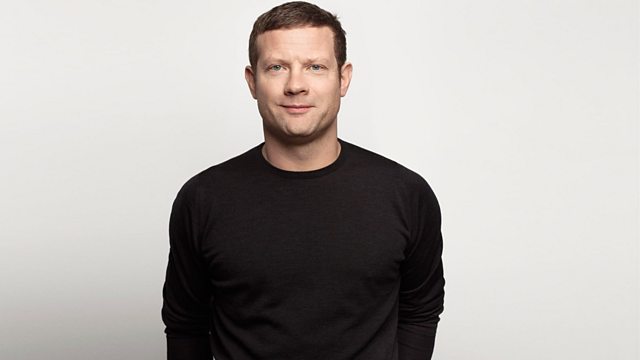Main content

Dermot O'Leary sits in
Wake up and embrace the day with Dermot O'Leary and the team. Konnie Huq calls in to talk about her new book Cookie and The Most Annoying Girl in the World!
Wake up and embrace the day with Dermot O'Leary and the team.
Dermot chats to Konnie Huq about her new book Cookie and The Most Annoying Girl in the World.
The managing director of Hamlyns of Scotland Oat mill Alan Meikle chatted to Dermot about all things porridge.
Along with Tina Daheley on news, Richie Anderson on travel he and the team have the best start to your morning.
There's also a daily Pause For Thought from Sheridan Voysey and listeners on the line, as Dermot entertains the nation with fun for the family!
Last on
Tue 4 Aug 2020
06:30
����ý Radio 2
More episodes
Previous
Pause For Thought

From Sheridan Voysey, Writer:
I thought I was getting through this Covid crisis OK—until a couple of weeks ago. That’s when chores started taking me longer to do, broken by spells of staring at walls. Articles took longer to write as I doodled instead of typed. I stopped posting on social media because I couldn’t focus my thoughts, and spent mornings squinting at calendars planning projects I then scrapped the next day. I feel like an old laptop streaming video on weak Wi-Fi—the hourglass symbol just keeps spinning. Psychologists say this foggy thinking is due to our brains over-processing during lockdown. Grocery shopping used to be simple, then health risks and limited delivery slots required extra thought. Becoming instant home schoolers and online workers took focus and energy.
They tell us uncertainty breeds stress and stress impairs thinking—and though lockdown is lifting, it’s still hard to make plans. Add in worry over jobs and loved ones and it’s no wonder we’re staring at walls. Like the old car I once had that would mysteriously stop on long drives, our minds go on strike when overworked. I’ve been looking for ways out of this lockdown fog. Following experts advice I’ve tried exercise—tick. Getting enough sleep—tick. Eating well—OK, room for improvement there. Tidying our workspace and cutting out smartphone scrolling reduces cognitive clutter too. But what’s helped me most has been a spiritual practice called breath prayer. As you might expect, a breath prayer is simply a short prayer said in a single breath.
I’ve written one based on some words of the apostle Paul. Sitting quietly, I pray each line slowly breathing in and out: God, I receive your love… and release my insecurity. I receive your joy… and release my unhappiness. I receive your peace… and release my anxiety. This combination of slow breathing and calling on God’s help has been key in lifting the fog. Mechanics never worked out why my old car suddenly stopped on those long drives. We’d just pull off the road, let it catch its breath for a bit, then drive on when it was ready. Maybe that’s the remedy for lockdown lethargy too. Pulling aside, taking time to breathe, accepting you may not cover so much ground today—and that's OK.
I thought I was getting through this Covid crisis OK—until a couple of weeks ago. That’s when chores started taking me longer to do, broken by spells of staring at walls. Articles took longer to write as I doodled instead of typed. I stopped posting on social media because I couldn’t focus my thoughts, and spent mornings squinting at calendars planning projects I then scrapped the next day. I feel like an old laptop streaming video on weak Wi-Fi—the hourglass symbol just keeps spinning. Psychologists say this foggy thinking is due to our brains over-processing during lockdown. Grocery shopping used to be simple, then health risks and limited delivery slots required extra thought. Becoming instant home schoolers and online workers took focus and energy.
They tell us uncertainty breeds stress and stress impairs thinking—and though lockdown is lifting, it’s still hard to make plans. Add in worry over jobs and loved ones and it’s no wonder we’re staring at walls. Like the old car I once had that would mysteriously stop on long drives, our minds go on strike when overworked. I’ve been looking for ways out of this lockdown fog. Following experts advice I’ve tried exercise—tick. Getting enough sleep—tick. Eating well—OK, room for improvement there. Tidying our workspace and cutting out smartphone scrolling reduces cognitive clutter too. But what’s helped me most has been a spiritual practice called breath prayer. As you might expect, a breath prayer is simply a short prayer said in a single breath.
I’ve written one based on some words of the apostle Paul. Sitting quietly, I pray each line slowly breathing in and out: God, I receive your love… and release my insecurity. I receive your joy… and release my unhappiness. I receive your peace… and release my anxiety. This combination of slow breathing and calling on God’s help has been key in lifting the fog. Mechanics never worked out why my old car suddenly stopped on those long drives. We’d just pull off the road, let it catch its breath for a bit, then drive on when it was ready. Maybe that’s the remedy for lockdown lethargy too. Pulling aside, taking time to breathe, accepting you may not cover so much ground today—and that's OK.
Broadcast
- Tue 4 Aug 2020 06:30����ý Radio 2
